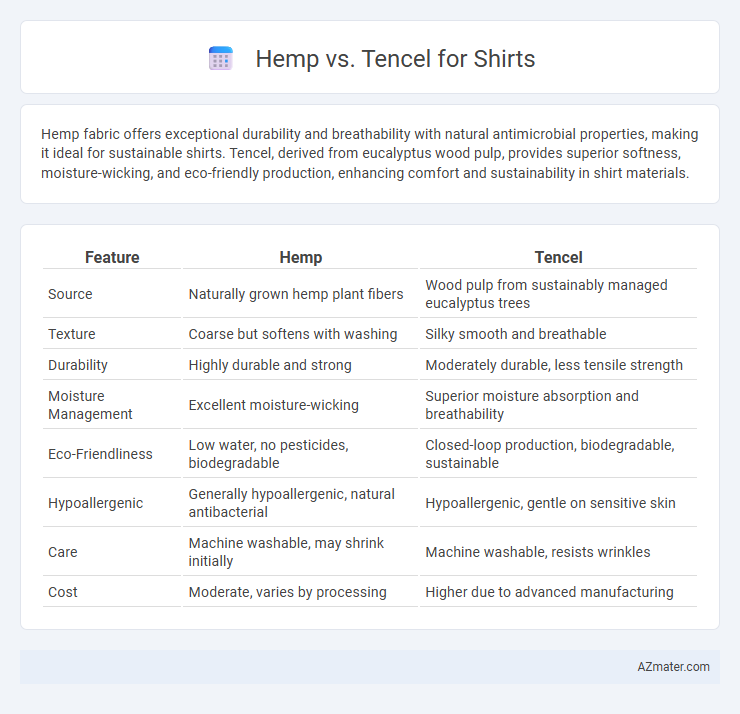Hemp fabric offers exceptional durability and breathability with natural antimicrobial properties, making it ideal for sustainable shirts. Tencel, derived from eucalyptus wood pulp, provides superior softness, moisture-wicking, and eco-friendly production, enhancing comfort and sustainability in shirt materials.
Table of Comparison
| Feature | Hemp | Tencel |
|---|---|---|
| Source | Naturally grown hemp plant fibers | Wood pulp from sustainably managed eucalyptus trees |
| Texture | Coarse but softens with washing | Silky smooth and breathable |
| Durability | Highly durable and strong | Moderately durable, less tensile strength |
| Moisture Management | Excellent moisture-wicking | Superior moisture absorption and breathability |
| Eco-Friendliness | Low water, no pesticides, biodegradable | Closed-loop production, biodegradable, sustainable |
| Hypoallergenic | Generally hypoallergenic, natural antibacterial | Hypoallergenic, gentle on sensitive skin |
| Care | Machine washable, may shrink initially | Machine washable, resists wrinkles |
| Cost | Moderate, varies by processing | Higher due to advanced manufacturing |
Introduction: Comparing Hemp and Tencel Shirts
Hemp shirts offer exceptional durability, breathability, and natural antibacterial properties, making them ideal for eco-conscious consumers seeking sustainable fashion. Tencel shirts, made from sustainably sourced eucalyptus wood pulp, provide a soft, silky texture with excellent moisture-wicking and hypoallergenic qualities. Both materials promote environmental benefits, but hemp excels in strength and longevity, while Tencel emphasizes comfort and smoothness in clothing.
Sustainability: Environmental Impact of Hemp and Tencel
Hemp fibers require significantly less water and pesticides compared to conventional cotton, making them an eco-friendly choice for sustainable shirts. Tencel is produced through a closed-loop process that recycles water and solvents, minimizing environmental pollution while utilizing sustainably managed eucalyptus forests. Both materials offer biodegradable and renewable options, but hemp's carbon sequestration ability and lower resource demand position it as a highly sustainable fabric for environmentally conscious apparel.
Fabric Feel: Comfort and Texture Difference
Hemp fabric offers a slightly coarse texture with increased durability, providing excellent breathability and moisture-wicking properties for comfort in warm weather. Tencel, made from sustainably sourced wood pulp, delivers a silky smooth feel with exceptional softness and a luxurious drape, ideal for sensitive skin. The contrast in fabric feel highlights hemp's rugged natural texture versus Tencel's refined smoothness, influencing the shirt's overall comfort and tactile experience.
Breathability and Moisture-Wicking Properties
Hemp fabric exhibits excellent breathability due to its natural porous structure, allowing air to circulate freely and keeping the wearer cool. Tencel, made from sustainably sourced eucalyptus wood pulp, is renowned for its superior moisture-wicking capabilities, efficiently drawing sweat away from the skin to maintain dryness. Both materials excel in comfort, with hemp offering durability and Tencel providing a silky softness ideal for breathable, moisture-managing shirts.
Durability: Longevity of Hemp vs Tencel Shirts
Hemp shirts offer exceptional durability due to their strong natural fibers, often lasting significantly longer than fabrics like Tencel under regular wear and washing. Tencel, while softer and more breathable, typically shows faster signs of wear and fiber breakdown over time compared to hemp. For consumers prioritizing longevity and resistance to tearing, hemp remains the superior choice for sustainable, long-lasting shirts.
Style and Appearance: Visual Comparison
Hemp shirts showcase a natural, rugged texture with a matte finish, providing an earthy, eco-conscious aesthetic that appeals to casual and outdoor styles. Tencel shirts offer a smoother, silkier surface with a subtle sheen, enhancing a polished and modern look suitable for both casual and formal wear. The distinctive weaves and fiber qualities of hemp create a more textured appearance, while Tencel's fine fibers result in a sleek, draping fabric that emphasizes refined style.
Manufacturing Process: How Hemp and Tencel Are Made
Hemp fabric production involves harvesting the stalks of the hemp plant, retting them to separate fibers, and then spinning these fibers into threads, emphasizing low chemical use and water efficiency. Tencel, derived from sustainably sourced eucalyptus wood, undergoes a closed-loop process where cellulose is dissolved and regenerated into fibers, minimizing environmental impact through solvent reuse. Both processes prioritize eco-friendliness, but hemp uses a natural retting method, while Tencel relies on advanced chemical recycling technology.
Skin Sensitivity and Hypoallergenic Qualities
Hemp fabric offers excellent skin sensitivity benefits due to its natural antimicrobial and hypoallergenic properties, making it ideal for those with sensitive or allergy-prone skin. Tencel, derived from sustainable eucalyptus wood pulp, is hypoallergenic as well and features a smoother texture that minimizes irritation and enhances breathability. Both materials provide durable, breathable options, but hemp's inherent antimicrobial nature gives it an edge for users seeking maximum protection against skin irritation.
Price Comparison and Market Availability
Hemp shirts generally cost between $30 and $70 due to its durable, eco-friendly fiber but face limited market availability compared to Tencel. Tencel shirts, priced around $25 to $60, benefit from widespread production and greater market accessibility, driven by efficient cellulose fiber processing from eucalyptus trees. Consumers seeking budget-friendly, easily accessible options often prefer Tencel, while those valuing sustainable, natural fibers may choose hemp despite its higher price and niche market presence.
Best Choice for Shirts: Hemp or Tencel?
Hemp fabric offers superior durability and breathability, making it ideal for long-lasting, eco-friendly shirts with natural antimicrobial properties. Tencel, derived from sustainably sourced eucalyptus trees, excels in softness, moisture-wicking, and wrinkle resistance, providing exceptional comfort and a luxurious feel. Choosing between hemp and Tencel for shirts depends on prioritizing rugged durability and environmental resilience (hemp) versus silky softness and high moisture management (Tencel).

Infographic: Hemp vs Tencel for Shirt
 azmater.com
azmater.com